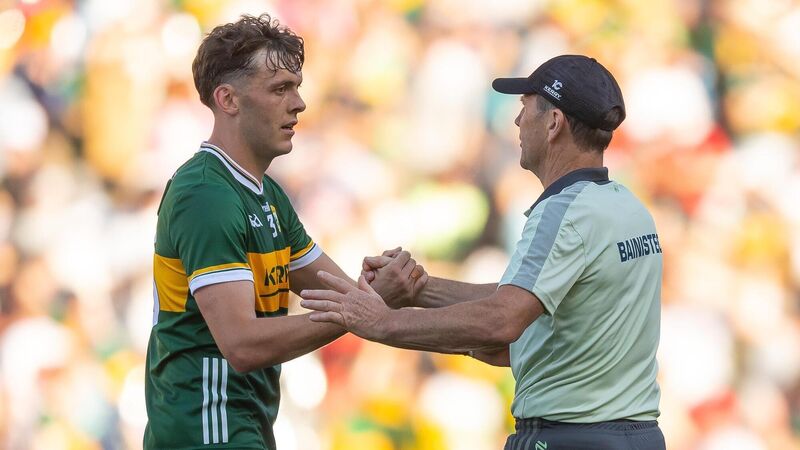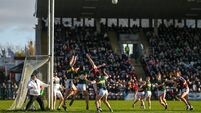'Live your life': Jack O'Connor has learned how to survive All-Ireland final week

Jack O'Connor said David Clifford has developed “mechanisms” to keep the heat off him at times. Pic: ©INPHO/Tom O’Hanlon
Jack O’Connor doesn’t specify which of the previous seven All-Ireland finals he is referencing. Doesn’t tell us whether it is one of the four successful or three unsuccessful. His tone, though, would suggest the fixture belongs to the latter group.
The Kerry manager was in holistic humour at the county’s All-Ireland final press afternoon in the Gleneagle on Saturday. An all-encompassing view was adopted and articulated for the duration of the 29-minute chat. Football rarely stood in isolation.
He recalled one final, presumably from either his first or second coming, where he’d the match played in his head “1,000 times beforehand”. Come throw-in, he was mentally spent and the ability to think on his feet considerably reduced.
It is a “mistake” he has not repeated. It’s a mistake he is forever endeavouring to ensure his players do not make.
Football has no superior in the Kingdom. That’s a blessing on a week such as this. But when results are not swinging for you, and we don’t need to go too far back Championship Road for the most recent example of that, the place and its people can be suffocating.
Escaping such is a challenge similar to countering Donegal’s relentless running game. Jack speaks about David Clifford having to develop “mechanisms” to keep the heat off him at times, even in his private life.
How his players live away from the dressing room dictates the heights they are capable of reaching when they take the green and gold shirt of its hanger and head through the tunnel. The inference here is not to nutrition, recovery, sleep patterns, or any of that. The inference is to mental freshness.
Jack constantly reminds his troops they are part of something that brings a lot of joy to a lot of people. That joy, though, should not be exclusive to those outside the dressing-room. It shouldn’t be enjoyable for the followers and endurance for those on the field.
The manager’s message is thus: Obsess about football when you’re in Fitzgerald Stadium on whatever midweek evening the schedule demands. But once you walk out onto Lewis Road after the post-training grub has been consumed, throw football into the boot along with the gearbag and leave it there.
Well, maybe wash the gear. But don’t go near football.
“Cognitive overload, or whatever the hell they call it” is to be avoided.
“You have to try and enjoy the season as a whole because otherwise it becomes a bit of a chore. I think even some of the players would say that there were other years where they clinched their fist, gritted their teeth, and wished their life away almost, and [wanted to] fast forward to the match. That doesn't really work. You have to take it in your stride and enjoy it as you go along,” says Jack.
“I've probably learned to do that better over the years. I’ve made plenty of mistakes. You give little bits of nuggets here and there and say, look lads, we'll switch on for the next two hours at the session, but when you are away from it, outside of a casual chat over a cup of coffee, try and switch off, do other things, live your life.
“Because at the end of the day, we are amateurs, we are not professionals. We need that bit of space to get that bit of energy back again. With social media, sure you can spend the whole day looking at stuff if you wanted. Away from training, you can't stay tuned in for every waking hour because otherwise you’ll be drained over the course of the season.”
That energy conservation is critical in this final week.
“There is no point in being all wired to the moon and having your energy spent by the weekend. All-Ireland final week can be draining enough with all the nervous tension involved in it, so it is really important that you manage your energy. It is not all stress, there is an enjoyable part, as well, where you feel a buzz around the county and you feed off that.”
A different sort of freshness. Sideline freshness. Jack’s theory is that the lifespan of a management team is three years. So, at that point, either shake it up or get out of town yourself, which he’s done in the past.
Mike Quirke, Diarmuid Murphy, and Paddy Tally departed in the off-season. In came former minor manager James Costello, Pa McCarthy, who served under Costello in that minor gig, and former Kerry forward Aodán MacGearailt. And for the role of coach, it was a case of back to the future in recruiting Cian O’Neill.
The manager explains the credentials sought in that recruitment process.
“It’s very important that you pick people who are good at the role, have potential to improve in the role, and be possible head coaches or managers down the line. I've always kept an eye on stuff like that.
“I brought in Éamonn Fitzmaurice and Diarmuid Murphy in 2009. Both of them proved after that they relished being in there. Éamonn went on to win a great All-Ireland in 2014, so it is important to give a bit of consideration to people with potential, people with a good knowledge of the game, and people who have the ability to improve.”
And, finally, to Sunday. The athletes versus the footballers. Is that a slight on Donegal, are Kerry nothing more than stylists? Jack doesn’t see either side digressing from their football principles.
“Donegal have a powerful running game, it comes very natural to them because they play a lot of their club football like that. It is often said it has to do with the conditions up there, it is fairly windy, and not conducive to kicking the ball much.
“It probably will be a clash of styles, but at the end of the day, it comes down to good decision-making and players that are comfortable on the ball.
“There are lots of ways to skin a cat, so we'll of course be endeavouring to move the ball as fast as we can, but that is not always possible.”





